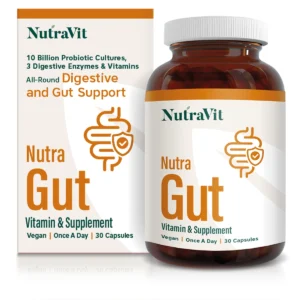Those of you interested in healthy eating can’t fail to have noticed the growing number of news articles and research papers looking into gut health.
The fact the state of our intestines plays a part in our overall health, and can directly affect our heart, brain and immune system isn’t new. But it is important. So important, in fact, that here at NutraVit we’ve launched a vitamin supplement targeted at improving gut health.
Called NutraGut, it consists of important pro-biotics such as Lactobacillus acidophilus and Bifidobacterium bifidum, as well as the prebiotic Inulin and three digestive enzymes. And it’s all backed up with a host of powerful vitamins and minerals, such as chromium and biotin.
What goes on in our gut?
Our gut (mainly the large intestine) consists of millions of microbes, including ‘friendly’ bacteria. These help break down the food and drink we consume, allowing it to pass through our body and distribute vital nutrients to various organs, as well as the immune system and central nervous system. This 2016 study shows the relationship between the gut and our immunity, while this 2012 abstract mentions the gut’s effect on the central nervous system.
Known as the gut microbiome (or ‘gut flora’), this important area of our large intestine hosts more than 1000 species of bacteria and pretty much plays the part of another body organ in that its proper functioning is essential for our health. Conversely, when ‘bad’ bacteria multiply in our large intestine we can become ill. This is referred to by nutritionists as ‘gut dysbiosis,’ and means there’s more ‘bad’ bacteria than ‘good’ in our gut.
The way to get around this is to boost our gut with ‘good’ bacteria by eating foods such as fruit, vegetables, nuts, seeds and legumes. But, with such busy lives we all have these days, that’s not always possible. And that’s where probiotics and a good vitamin supplement can help.

Probiotics are particularly useful since they can directly restore the balance of bacteria between good and bad by helping to overpower the microbes we don’t want and which can lead to ill health. Good bacteria, such as Lactobacillus acidophilus and Bifidobacterium bifidum can also help seal the walls of the large intestine and in doing so prevent what is known as ‘leaky gut syndrome.’ This is when toxins can seep through the holes in the gut and get into our blood stream and other parts of the body where it can cause disease if allowed to go on for long enough.
What are the physical symptoms of an unhealthy gut?
Irritable Bowel Syndrome (IBS) and other inflammatory conditions, such as Crohn’s Disease and ulcerative colitis may be the result of poor gut flora. Symptoms of which can be uncomfortable, include cramps, bloating, expelling gas and stomach pain.
How an ‘unbalanced’ gut flora can affect us mentally
It’s well-known that serotonin is one of the ‘happy neurotransmitters in our brain. But, did you realise that it actually comes from the gut? That’s because it’s produced from the flora in our large intestine.
Not only that, but the brain and the gut are connected via many nerves with the result the gut can send messages to the brain. This is referred to as the microbiota–gut–brain axis. Various studies show a connection between a number of mental disorders – many of which are serious – and certain type of gut flora. These include not just depression and anxiety, but also bipolar disorder and even schizophrenia. This could be down to diet, however, so more research needs to be carried out in the field before conclusive evidence can be drawn.
 FREE UK DELIVERY ON ORDERS OVER £20.
FREE UK DELIVERY ON ORDERS OVER £20. WORLDWIDE SHIPPING AVAILABLE
WORLDWIDE SHIPPING AVAILABLE

